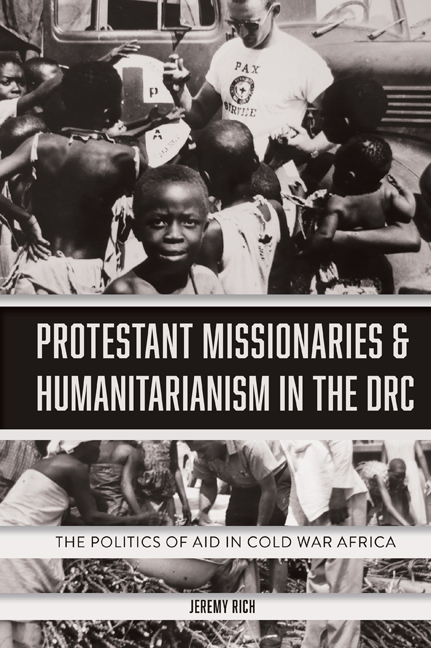Book contents
- Frontmatter
- Contents
- List of Illustrations
- Acknowledgements
- List of Abbreviations
- Introduction
- 1 The CPRA, Protestant Missions, and the Congo Crises, 1960–1965
- 2 The CPRA and Luba Refugees in South Kasai, 1960–1962
- 3 The CPRA and Angolan Refugees in the DRC, 1961–1967
- 4 The CPRA and the Simba Revolts, 1964–1967
- 5 Operation Doctor: The Rise and Fall of a Protestant Short-Term Medical Volunteer Programme
- 6 Protestant Volunteers and Medical Practice in the Congo in the 1960s
- 7 Changing Dollars into Zaires: The Challenges of a Humanitarian Aid NGO in the DRC, 1965–1973
- 8 The Centre for Community Development
- Conclusion
- Bibliography
- Index
4 - The CPRA and the Simba Revolts, 1964–1967
Published online by Cambridge University Press: 11 September 2020
- Frontmatter
- Contents
- List of Illustrations
- Acknowledgements
- List of Abbreviations
- Introduction
- 1 The CPRA, Protestant Missions, and the Congo Crises, 1960–1965
- 2 The CPRA and Luba Refugees in South Kasai, 1960–1962
- 3 The CPRA and Angolan Refugees in the DRC, 1961–1967
- 4 The CPRA and the Simba Revolts, 1964–1967
- 5 Operation Doctor: The Rise and Fall of a Protestant Short-Term Medical Volunteer Programme
- 6 Protestant Volunteers and Medical Practice in the Congo in the 1960s
- 7 Changing Dollars into Zaires: The Challenges of a Humanitarian Aid NGO in the DRC, 1965–1973
- 8 The Centre for Community Development
- Conclusion
- Bibliography
- Index
Summary
The Armée National Congolaise (ANC), the armed forces of the US-backed Congolese government, led a successful campaign from 1964 to 1967 against a coalition of leftist rebels, the Conseil National de la Libération (CNL). These revolutionaries, popularly known as Simba (lions in Kiswahili), intended to overthrow the pro-Western Congolese government in Kinshasa. Although the CNL's armed wing, the Armée Populaire de Libération (APL), managed to capture almost half of all Congolese territory by the summer of 1964, the US government took a decisive role in the APL's defeat. ANC forces, relying on expatriate mercenaries, captured most major cities in eastern DRC by December 1965. Pierre Mulele's rebels in the western Kwilu province, cut off from rebels further east, became constricted by ANC forces.
Assessing the final collapse of the rebellion, US officials in 1968 credited humanitarian aid as a key factor. Rebel forces had little choice left but to give up by 1968. One reason was hunger. The Congolese arny cut off rebels from US food supplies sent through the CPRA and other agencies and made it very difficult for rebels to maintain their fields. Robert McBride, the outgoing US ambassador to Congo, reported that Congolese soldiers had apprehended over 19,000 rebels in Kwilu after Mobutu's 1968 general amnesty to rebels. Soldiers remained to give out food and medical supplies to rebels and civil-ians who left isolated forest areas still in rebel hands. Far to the east, general Etienne Tshinyama credited the surrender of several thousand rebels on the eastern Congolese border as being ‘as a result of the [Congolese army]'s carrot-and-stick mop up strategy.’ Civilians and APL soldiers alike, at the mercy of Congolese troops for food and shelter, often died from hunger in detention camps.
Researchers have long discussed the US government's covert assistance to explain the ANC's victory. Formal political and military history has taken centre stage, leaving out the humanitarian crisis that came in the wake of the revolt. The fighting led to famine and the killings of thousands of civilians by the rebels and the Congolese military. Western media coverage highlighted how rebels butchered European and North American prisoners, particularly missionaries. What has been most painfully absent from the research on the rebellions is the suffering of Congolese civilians in the conflict. Emery Kalema's recent dissertation on the government repression of the Mulele revolts is a startling and vital exception to this rule.
- Type
- Chapter
- Information
- Protestant Missionaries and Humanitarianism in the DRCThe Politics of Aid in Cold War Africa, pp. 108 - 131Publisher: Boydell & BrewerPrint publication year: 2020



